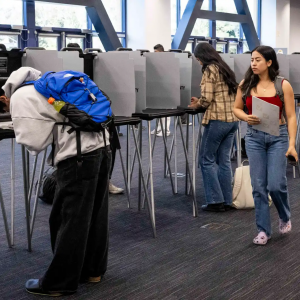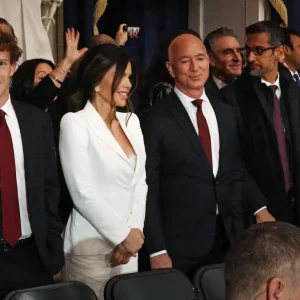The Citizens United Supreme Court case has not only revolutionized campaign  finance but has also solidified the immutable power of corporate companies. The Court ultimately decided that corporations are composed of “associations of citizens” and that protecting corporate speech was a way to “protect the rights of those citizens.” The ruling ended the ban on corporate and union expenditures for electioneering communications and equated spending money with free speech, allowing corporations to spend unlimited amounts on political propaganda. The decision legitimized and paved the path for special interests and lobbyists to play a significantly larger role in the federal government’s decision-making, effectively “drowning out” the voices of the people, opposite of the Court’s stated intentions.
finance but has also solidified the immutable power of corporate companies. The Court ultimately decided that corporations are composed of “associations of citizens” and that protecting corporate speech was a way to “protect the rights of those citizens.” The ruling ended the ban on corporate and union expenditures for electioneering communications and equated spending money with free speech, allowing corporations to spend unlimited amounts on political propaganda. The decision legitimized and paved the path for special interests and lobbyists to play a significantly larger role in the federal government’s decision-making, effectively “drowning out” the voices of the people, opposite of the Court’s stated intentions.
Opponents of the final ruling were furious at its implications for democracy. Senator Udall (D-CO), in particular, introduced a constitutional amendment, known as Democracy for All, which clearly distinguishes between “natural persons and corporations or other artificial entities created by law.” In his fight to reestablish democracy, Udall stated that “Americans’ right to free speech should not be determined by their net worth,” and wanted to redefine the Citizens United interpretation of the First Amendment. Further, Udall claimed that the most practical resolution included amending the Constitution, “which would overturn bad decisions and prevent future ones.” However, the bill recently failed to pass in the Senate, with a 54-42 vote in favor of the measure, just short of the 60-vote threshold.
Unfortunately, a constitutional amendment may not be feasible due to the polarizing nature of Congress. Instead, a more practical first step may be to address one of the biggest problems of the Citizens United case: campaign finance secrecy.
Even though the Supreme Court reduced the restrictions on corporate electioneering, it still upheld a nearly unanimous vote 8-1 in favor of campaign finance disclosure. The Court mandated there be “prompt disclosure” that “enables the electorate to make informed decisions and give proper weight to different speakers and messages.” However, proper disclosure still remains a prominent issue.
Although federal law requires political advertisers to file a disclosure report once they have spent more than $10,000 on campaign advertisements, the Federal Election Commission actually allows political spenders to withhold all information about their source of funds unless contributors clearly indicate that their donations were given to further a political ad. As a result, many donors have concealed their identities, shielding the amounts of their donation from public knowledge, allowing them to take advantage of political candidates and playing a larger than necessary role in federal elections. For example, in 2010, the first federal elections after Citizens United, nearly $135 million worth of money funneled in were spent by unknown sources. This level of secrecy holds negative implications for the future, with anonymous donors possessing significantly larger influence on the elections than the American voters. Super PACs, in particular, may raise unlimited sums of money from associations and individuals, corporations, and even unions to advocate for or against political candidates. Although Super PACs must report all donors to the Federal Election Commission, they do so at their own discretion. Without campaign finance reform, Super PACs will continue to unfairly take advantage of loopholes in the law.
Fortunately, a viable solution begins with the recent success seen in Massachusetts’ state legislation. On July 24, 2014, the Massachusetts Senate unanimously approved a cutting-edge law that strengthened campaign finance regulations and required the disclosure of funding donors. The legislation mandated that independent expenditures “disclose their donors along with their expenditures within seven days of running a political ad.” In addition, the top five donors who contribute over $5,000 must also be listed in the ad. Anne Borg, co-president of the League of Women Voters, believes that the act “is an important step in creating a more transparent election system.” This act has been instrumental in enforcing accountability in Massachusetts’ political decisions.
This new piece of legislation, if implemented at the federal level, certainly bodes well for campaign finance disclosure. By expanding current reporting requirements on finances for campaign advertising and enhancing the timetable for reporting such spending, the law safeguards the “integrity of our elections” and “shore[s] up public confidence in our democracy.” Increased disclosure decreases the level of influence anonymous donors have on federal elections. By holding them accountable to the American people, special interests will have a reduced effect on future political candidates and future government decisions.
If reform is not enacted soon, democracy may be at risk in America. Without campaign finance transparency, a system of puppetry will continue. Anonymous donors will continue to wield disproportionate amounts of political influence, enough to unfairly leverage their special interests over the voices of the American people. This imbalance violates the value of democracy so highly touted in today’s society. In order to promote more accountability and transparency, the federal government should consider following in Massachusetts’ footsteps.
Featured Image Source: theatlantic.com via takomabibelot/Flickr, June 2014





Be First to Comment